-
More Conversation With Arnon.
Part Two - Part One
Personal
Insights.
What is the craziest thing you have ever
said (or done) at an interview and still got
the job?
When the interviewer asked me about certain
technologies, I told him that I didn't know
them, and asked him about them. He was talking
almost the entire interview. I got the job.
10/4/13
What's the
greatest experience you've had when your
flight was delayed?
I had never flown business class before. Coming
back from the Philippines to Portland, OR, I had
a 4 hour layover in Taiwan and another one in
San Francisco ... I was up for a very broken
night. I decided to pay $35 to go to my
airline's lounge, which gives comfortable
seating, WiFi, and a large buffet of food. For
four hours, it was worth it.
About one hour in (after already having a great
dinner), they asked me if they could change my
flight. I would be in Taiwan for 8 hours, then
jump flights in Seattle, and take a hopper to
Portland. They gave me access to a recliner
chair in a private room (so now I got 7 hours of
sleep), and upgraded me to business class.
For those of you who have never experienced
international business class, there were hot
moist towels all the time, so I felt refreshed
(since I was already well rested, I didn't need
to sleep on the flight). The seats recline all
the way back and there is no seat next to me. I
got to pick my movies/shows on the screen
(that's becoming more common these days). Food
was first class quality.
Suffice it to say that my trip went from a
sleepless night to a dream vacation in itself. I
have a rule now that if my layover is more than
2 hours, I go to the airline's lounge. It
probably wouldn't be THIS good in the US (US
first class is worse than international business
class), but the amenities are worth it, and
there are possible upgrades.
9/26/13
Are relationships
on the Internet really real?
Relationships exist at multiple levels:
- Physical
- Emotional
- Mental
- Spiritual
In college, I had a couple of internet (and
eventually phone) romantic relationships.
Although the physical is strongly missed, since
it is not there, the other levels are much more
intense. The bond feels stronger, much faster
(maybe too fast) than when the physical
relationship is not there.
Since you were not specific to romantic
relationships, I work in an international
company, and have build strong mental-level
relationships with people whom I have never met.
When the IM turns green, that has the same
effect as them coming into the office. IMs feel
like having a conversation over the cube wall. I
have built quite good friendships with these
people whom I have never seen. Of course, the
relationships get stronger with those whom I am
also on the phone with 5 times a day.
And I have a depth of mental relationship with
you people on Quora, this knowledge/idea
network, that is completely different.
So, in my opinion, these are not
superficial. Only those who believe that
physical is the most important would say so.
12/24/11
Is it
more selfish to have children or to remain
childless?
I had a friend once who said it was selfish to
want YOUR OWN child, when there are so many
children out there needing a loving parent. He
adopted.
12/23/11
What are the
things/customs you do or follow without any
reason?
I'm a white guy and I don't write in or highlight
book pages, though I learned it in adulthood. It's
a gesture of respect to the knowledge in the book
and the author of the book. The same with pointing
feet towards the teacher of a class. Since I was a
kid, I never wrote in books for the same reason
(though I don't know where I learned that ...
everyone around me did).
May 28th 2013

The Mind.
INTELLIGENCE, STUPIDITY, EMOTION, THOUGHTS:
How much untapped brain power exists in the
world?
Since the explanation of the question refers to
mental power (not the physical computing
capacity of the brain), I will answer to that
framing of the question.
I have found that a lot of people are great at
focus, they just focus on the wrong that they
received 20 years or 20 minutes ago, rather than
focusing on the solution which would improve
their and others lives.
I have found that a lot of people understand
numbers and math, but apply it to baseball or
gambling or gaming, rather than economics and
saving for the up and down cycles in their
lives.
I have found that a lot of people understand
their limits (whether their own or imposed by
others), but choose to stay within them (very
precisely and carefully in some cases), rather
than regularly making the effort to step beyond
them. This is also a use of mental power.
I have found that a lot of people
apply their mental power to understanding the
people around them, rather than math and
science. This is just as valid a use of mental
power. My brother, for
example, is a social genius ... though I'm
not faulting his math and science.
I don't think that mental power is unused, but
rather misused (based on the speaker's
perception). When people are told they don't
apply themselves, that just means they are not
applying the mental power to what the speaker
believes they should. I have found that a lot of
people make choices in life that others don't
agree with.
That being said, there are those who can apply
more of their mental power to positive, rather
than destructive (self-destructive or externally
destructive), endeavors. How many? 100% of
humanity. Every single one of us, even the
most positive, has some place we put mental effort
where it detracts from our lives. Every single one
of us has the capacity to improve our lives every
day through the proper application of mental
effort.
5/19/13
Is it possible to be
really smart in some ways and really stupid in
some others?
Geeks who read Quora tend to be intellectually
smart. Socially smart is another story ... or is
that just me :)
4/13/12
How can you tell if someone is
smart?
By the questions they ask.
Anyone can talk in depth about a subject they
have spent a lot of time on, but how many
willingly open their minds continuously to
expand further? They must question and then
LISTEN to the answer (I know many who question
and then keep talking.)
12/25/11
Does being
extremely smart make you lonely?
Smarts do not make you lonely. Arrogance about
how smart you are is what drives people away and
makes you lonely. If you are really smart, you
should study what makes people like people more
(e.g. humility, joyfulness, talking to people at
their own level) and implement those practices.
3/26/13
How would you define
intelligence?
The ability to question appropriately and LISTEN
to the answers (too many people question and just
keep talking).
3/3/12
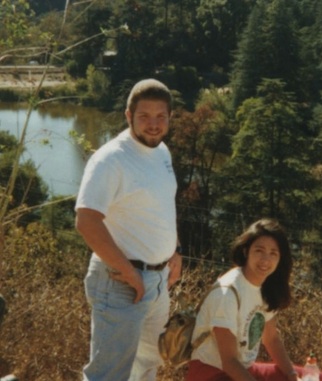
Arnon and friend Gina
1997.
Hiking the Santa Monica Mountains.
What can I do to
become more intelligent?
Throughout your day, don't take the easy route
to an answer. Need to add up some costs? Try to
do it in your head before pulling out the
calculator. Look up every word you read that you
don't understand, and work to understand the
roots of those words (your vocabulary will grow
by leaps and bounds). After an interaction with
a person, take some time to review it and
consider what may have been behind what was said
and what you could have added/changed in the
conversation. When you have a question, spend a
few minutes thinking through possible answers,
before you jump on Google or Quora. And when you
read the answers, try to think of other
information that might not have been included.
Every moment of every day is an opportunity to
sharpen your mind. Even if you don't have the
time every day to follow the excellent
suggestions given, you DO have time to think in
your own life more. At first it will be hard,
but that means you are exercising the mental
muscle. Over time, you will think faster and be
more aware of things in your day. You know you
are doing it right when your number of questions
in a day is growing. "Judge a person by their
questions, rather than their answers" - Voltaire
(yes, I looked up that quote before putting it
here, and realized I had it wrong before and the
wrong person). Always be learning.
12/8/11
Do intelligent
people tend to be unhappy? If so, why?
The technical term is "morbid introspection". We
always are good at less things than we are not
good at. We don't know more things than we
know. As we become more aware of our
"failings", it is easy to be burdened by the
weight of it. This is actually a bit of ego
thinking one has the ability or responsibility
to know everything.
After one gets tired of beating oneself up over
it (I used to call it "mental
self-flagellation"), one begins to realize that
one is not expected to know everything and these
"failings" are actually opportunities to grow.
Historically, those who are the wisest are also
the most humble, because the road ahead gets
LONGE - one realizes that what one knows is but
a drop in the bucket.
12/17/11
How should one react to
controversial opinions held by highly
intelligent people?
Don't blindly believe what I say. Don't believe
me because others convince you of my words.
Don't believe anything you see, read, or hear
from others, whether of authority, religious
teachers or texts. Don't rely on logic alone,
nor speculation. Don't infer or be deceived by
appearances.
Do not give up your authority and follow blindly
the will of others. This way will lead to only
delusion.
Find out for yourself what is truth, what is
real. Discover that there are virtuous things
and there are non-virtuous things. Once you have
discovered for yourself give up the bad and
embrace the good.
- The Buddha
If he would say that about his own
words, what more of the words of any other wise
or intelligent people. We must discriminate with
regards to what everyone tells us, no matter how
highly we regard what they say in certain
subjects.
1/3/12
How can you tell
whether someone is wiser than you?
To answer this, one must first define a
measurement scale.
I think the wisest are open to the largest set
of possibilities, including mine. So a wise
one will question intelligently and
respectfully, looking to learn the
most. Then they will share their opinion
(as opinion, not fact) in the best way for me to
understand it. They might say it in 100
different ways to 100 different people, because
what's important is the concept, not how it's
said.
12/30/11
Why is it important to
be smart rather than important to be good?
"Good" implies you have skill in the referred to
subject. "Smart" implies you can analyze the
subject and build more skill, becoming "good",
then "better", then "best". One who is smart can
usually also continually grow to master multiple
subjects.
This implies
that it's more important to teach children
passion in learning and how to go about it,
rather than rote learning. It is more important
to learn concepts than details. Learning a
multiplication table makes a child "good" (from
1 to 20), but learning why one wants to multiply
and how it applies to the real world ("If you
want 5 of that toy and each is $6.99, how much
do you need?"), they will quickly learn 1
through 20 and far beyond.
Many schools will teach the proper way to write
a letter first. Then have them write words and
learn spelling. Then sentences and so on, taking
years to get "good". My
son's school took the "smart" approach, and
he wrote a BOOK (literally, all the kids
did) in the first semester of kindergarten.
Who cares which order he writes a "b" in if
it looks like a "b". Who cares how he spells
a word initially, as long as it's
understandable ("nise" vs. "nice" can be
learned later). Instead, he wrote a book
about a fictional character he made up.
This generates more passion to write and
read, where those spellings will be corrected
naturally.
Note: the teachers do correct
spelling occasionally, but only on about one
writing sample in ten ... to keep the momentum
in the right direction.
12/23/11

Find your
passion, do what makes
you happy, and never stop learning!
The two are functionally the same in my opinion.
Assuming you are looking to hire, don't.
That being said, people who are intelligent must
have some place to exercise that intelligence.
It's like a muscle - if they don't use it, they
ARE generally stupid. Therefore, finding out if
someone is intelligent requires finding those
areas in which they use that muscle. In those
areas, they would be enthused and coherent.
I would ask that person what they were
interested in and have a discussion about that
subject. If they show deep thought and clear
understanding of the subject, it means they have
intelligence in subjects where they choose to
exercise it. Now, if you want them to
exercise it in another subject, you are going to
have to find a way to motivate them to be
enthusiastic about that subject ...
4/3/12
Do intelligent lazy
people achieve more in life than intelligent
active people?
I tell people that I'm good because I'm lazy.
Rather than trying to power through in the most
obvious path, I sit back for a bit to think if
there is a more efficient path to what needs to
be achieved. I regularly get the same results in
one half to one tenth the time.
Let me give some specific examples in software
development:
1) Testing is boring, long, and a lot of effort.
So I have learned to test in my head. As I'm
coding, I'm running through potential flows of
the system, and I correct problems before they
would ever be head scratchers in testing. It
doesn't catch everything, but it reduces testing
and searching time significantly.
2) Because I have the ability to have the whole
system in my head, I can notice where something
is becoming (or will become) repetitive and code
a class which takes multiple instances into
account.
3) I think ahead to what the
logical next steps of the system are in the next
6-12 months, and code those flexibilities into
the system. It might take an extra half an hour
right now, but it saves hours when
marketing/executives ask for it and I say,
"Done!"
4) When
talking to a client, I'm designing the system in
my head down to quite a bit of detail. Many
times, I have told them what won't work (for the
system or for user interaction) right in the
first hour or two of talking to them about
requirements. These changes, made halfway into
development (or even worse, at user testing),
would take much more effort. Sometimes,
alternative ideas I have come up with at these
meetings have become the centerpiece of the
site, rather than what the client thought they
wanted.
Applying extra mental leverage up front allows
me to save a lot of time in the end, and
increases customer satisfaction.
Cases in point:
a) For a performance management
system, my colleagues were proposing (and
coding) a 40 table data structure. I proposed an
alternative with three tables, one being a
hierarchy linking table. This new structure had
MUCH more expressive power, and MUCH more
flexibility. It allowed the business
owners to change the structure of measurements
and their meanings on the fly, literally, and
also differently per business unit, where the
other structure would have been locked in place
(we gave them administration screens to change
the structure and calculations). It also allowed
both the data warehousing code (PL/SQL which
rolled up and down the hierarchy doing
calculations) and the database linking code, and
the Java code working on the display to be MUCH
simpler.
b) Using the principles above, I was able to do
a complete restructuring of a large code base
for a major site (moving to Hibernate, Spring,
and a layered architecture) in two weeks because
I was able to test much of it in my head. I was
able to change 20-40 classes a day, running
tests for everything I had done at the end of
the week (or the end of a module). Those who
would have been testing each step would have
taken two to three months (I know because I have
seen it done).
BEWARE: This does not work
for all things! Being efficient with my wife
DOES NOT WORK! She sees it as cold and
distant. She also wants to hear the
steps in my thinking, not the jumps that I
make. The only thing that laziness buys me at
home is that I realize it's more effective to
hire someone to clean than do it myself ...
and I still get it from my wife if I don't
make SOME effort cleaning the dishes or after
the kids. Perceived effort is important
sometimes here. We had to interview 5
location, 5 bands, etc. etc. for all of our
wedding stuff, even though we both knew the
first or second was the one we were going
with.
12/30/11

Arnon,
myself, Gina, and Rog, climbed a mountain in 1997
on my birthday - what a happy, beautiful
afternoon. Sixteen years later, in 2013 on my
birthday, i was in an Oregon hospital visiting
Arnon who was battling to save his life.
Are
thoughtful people happier or less happy than
non-thoughtful people?
It depends on the focus of one's thoughts.
If one focuses on their internal weaknesses and
the failings in the world, they take themselves
down a vicious circle. The technical term for
constant thought on one's weaknesses is "morbid
introspection" (I used to call it "mental
self-flagellation"). We always are good at less
things than we are not good at. We don't know
more things than we know. As we become more
aware of our "failings", it is easy to be
burdened by the weight of it. Add to that
a negative view on the external world, and a
thoughtful person will become more and more
unhappy.
If one instead chooses to focus on
their strengths and the beauty and joy in the
world, one begins to realize that one's
"failings" are actually opportunities to grow.
These ones take joy in the challenge of life and
every step along the way. These are likely
happier than the one who thoughtlessly takes
life as it is without direction, purpose, or
passion for growth (as in the example hedonist
given by Nan).
There are many variations in between
these. Ultimately, it is not one's
thoughtfulness that makes one happy or unhappy,
but where one focuses one's thought and the
interpretation of the evidence around them.
2/7/12
What is the difference
between consciousness and mind?
I think of meta-levels. The mind
thinks. Consciousness is thought ABOUT
thought, meaning thinking about our own thought
process and the effects on the world around
us. This is where self-awareness begins (the
child realizes he is separate from this thing he
waves in front of his face).
12/24/11
How does one achieve true
objectivity?
One doesn't. We are subjective
beings. We can adapt for that subjectivity,
but never eliminate it.
6/23/12
How valuable is Myers-Briggs
personality typing?
A few years ago, I think I came out as an
INTP. I just took the test again and came
out as an INTJ. After reading Paul King's
answer, I read both of the descriptions, and
both could describe me at different times.
Whether I exercise one or the other is really
situational or based on my confidence or
interest at the time. Very interesting.
1/2/12
How do I get
over "analysis paralysis"? I know what I want
to accomplish, but I spent too much time
thinking and not doing.
Take the first step. Once you are moving in
a direction, you will learn more about that
direction, and can re-adjust. As others
have said, in every step, in any direction, is
growth ... even if the only growth is having
overcome the fear to take that step.
11/23/12

Arnon 23 yrs
old, out on
the town having fun!
Horses: Do
horses celebrate New Year's?
Neigh.
9/21/12
Is there a foolproof way
to tell identical twins apart?
Pierce an ear for one of the children ;)
2/7/12
Is black a color?
My sons use a black crayon ...
12/30/11
Does God have feet?
If God is everywhere and nothing is outside of
God, then God has at least 7 billion pairs of
human feet and innumerable animal feet, table
feet, chair feet and so on.
12/23/11

Indian
Restaurant 2007, Arnon
his wife, Gina and her husband.
Vegetarianism.
What does it feel like for a
long-time vegetarian to discover they've
accidentally consumed meat?
I was recently served chicken soup instead of the
vegetable soup I ordered. It was a dark dinner
theater, so I didn't notice and just scooped it
into my mouth. I noticed the taste was
strange, and as I chewed I noticed that the
texture was more meaty than expected. I looked at
the next spoonful in the dim light to make sure I
wasn't fooling myself with a unique vegetable
(it's happened before, but more often with fake
meats or burgers). Vegetarians need to pay
close attention with soups because many have meat
base, but this had actual chicken in
it. After that, I took it back and got what I
ordered.
I didn't have any of the emotions others have
stated. It was just a mistake. I was
taught long ago, "What goes into your mouth may
dirty your body, but what comes out of your mouth
can dirty your soul." What one eats comes out in a
few hours or a day ... what one says affects their
character. When something like this happens, if
one gets angry and especially says negative things
to the waiter, they may as well have just eaten
the meat. It would have had less negative effect
on their system.
6/18/12
Should I feel sad while
eating animals?
No. Enjoy the food you chose to eat. I say this as
a vegetarian. But that's my choice, and have no
issue with those who make other choices.
5/9/12

Random
Insights.
How could it be argued that imagination is
more valuable than knowledge?
Imagination creates hypotheses. Knowledge is the
result of testing those hypotheses.
4/8/12
Do the same laws of
physics apply everywhere in the cosmos?
To be honest, we don't know. We assume so and
test those hypotheses through telescopes, but
there may be exceptions to the rules.
4/22/12
Assuming Moore's law
will be correct for the next 100 years. How
long do we have before artificial
intelligence takes over the planet?
42yrs.
12/23/11
What if there are
phenomena possible in this Universe, in
which one needs to believe first, in order
to understand/observe rather than
understand/observe in order to believe?
As I was reading through these answers, it
occurred to me that observation bias plays a big
role here. Some people can have the truth put
right in their face, but will not see it. It
always comes back to whether or not someone
accepts (believes) the axioms on which logic is
based, and the evidence which leads to
conclusions.
Some other historical and modern
cases which everyone believes in now:
a) Global
Climate Change ... only those who accepted the
evidence ("believed") could see the trend.
b) The earth goes around the sun (people didn't
believe it even when evidence was given ...
until they did)
c) The earth is round (though I've seen other
questions on Quora that say people back then
weren't as disbelieving as popular stores say).
Additionally, there is what one could call
perception bias (or "I'll believe it when I see
it"). It is fair to say that that which we can
cannot perceive is MUCH more than what we can
perceive. Mankind has built tools to detect
things outside of our perception and translate
them to perceivable signals (microscopes, x-ray
detectors, etc). However we have just begun to
build these detectors. One must have a
hypothesis and believe in such hypothesis to
even conceive of building such a detector.
Lastly, I had another thought (which one could
call mass belief effects): If enough people
believe that stock X will go up, you will see
it.
2/11/12
What did
Nietzsche mean when he said "if you stare into
the abyss, the abyss stares back at you"?
Notice he said "stare" or "gaze long", not just
look into the abyss. As you think deeply
(about anything), that thought changes you.
12/23/11
What's the insight
inside "the truth will set you free"?
It is the process of thinking about what is true
that allows you to escape delusions. Thinking
deeply takes effort. The reason that they
are called "mass delusions" is that the masses
are mentally lazy, and will accept the truth
that is most convenient, even if it does not
serve them. "The truth will set you free" is
about the process, not the end goal.
12/23/11
What are some
theoretically possible ways to achieve
faster than light communication?
Telepathy.
10/8/13

Arnon is the blond on
the left with the red heart. He inherited his
super intelligence from his parents and grand-parents.
Education.
As a top high school student, how can I
deal with depression and frustration
stemming from the fact that high school has
largely been an unenjoyable waste of time
for me?
Just one additional note: your adult life does
not necessarily have to be mindless work. I
noticed a lot of people saying that. Some of it
may be, but if you do what you enjoy, most of it
is enjoyable and mentally stimulating.
I agree with what many said about taking the
time to do additional work. Don't feel trapped;
feel happy that you have time to study what you
love. My entire adult life I have had
two simultaneous (and sometimes changing)
careers, each with multiple projects. I
don't have too many chances to get
bored. In school, I studied ahead, and
asked what I thought were cooler questions.
I wish I had thought of what others stated here
to make the study of my fellow students a second
career ... What motivates them? What are their
fears and joys? What are their strengths
and weaknesses? That study will be time
well spent and serve you well.
12/13/11
What data structures
does the human brain use?
This can be answered at many levels.
Technically, the brain stores information in the
chemical and electrical composition of the
neuron and in it's connections to other neurons.
But I choose to answer at a level
that is more practical to our daily lives.
Sometime in high school, I figured out how my
mind organized information. It puts related
facts in folders where my mind organized them
into coherent responses. These folders have
connections to other folders in related subjects
or higher levels (meta-levels) of the same
subject.
When I realized this, I found that if I didn't
understand a subject, I could imagine a folder
with a title and just dump all the information
in there. At a certain point, once a critical
mass of information was in the folder, it would
start to self-organize and gel into
understanding. To this day, I still create a
title first whenever I am starting a project or
trying to understand something (I have a big one I'm
working on labelled "Happy Wife").
The folder title doesn't have to be "right"; it
just needs to be indicative. What is important
is the folder.
I don't really know the structure inside the
folder, but that is probably the way it should
be. Initially I just pile things in there when I
don't understand. Eventually, I start to
understand some of the connections inside the
folder. Then the structure grows from there,
sometimes splitting into sub-folders as I
understand the sub domains better.
It was only years later that I saw studies that
framed the mind structure in similar ways. Now
they have "mind maps" As a tool (I don't use these
but it's similar in some ways).
12/11/11
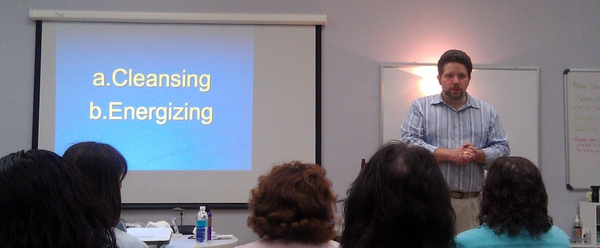
Arnon loved being in a classroom
both as a teacher or student.
Do more
intelligent students benefit less from homework
than other students in any given class?
How about an answer from an intelligent student.
What qualifies me as an intelligent student?
* Graduated 10th in my class at a Magnet High
School for gifted children.
* 4.1 HS GPA (this school put an A grade at 4
and an A+ at 4.33).
* 1470 SAT score (back when SATs went to 1600).
* 3.75 college GPA - Magna Cum Laude honors.
* Graduated college with 2 majors and 3 minors
and 1.5 times the credits I needed to graduate.
I WANTED to learn more. When I was young, I
would take things apart to learn more about
them. If I hadn't been given homework, I would
have researched additional things. The homework
helped to guide my studies. My standard
work in late HS and college was to do the next
day's reading so that I could ask more
intelligent questions in class the next day. I
noticed that knocking the teacher off the
standard teaching track gave all of us more,
because it also brought out more passion from
the teacher and showed their deep understanding
of the subject. I STILL learn constantly. If I
don't understand a word that I'm reading, I look
it up (rather than just let it pass by) and I
look at the roots of that word so that I can see
if I can apply it in other contexts. There are a
multitude of opportunities to always be
learning.
It is a fallacy to believe that a
teacher can teach 25+ students all at their
individual level. Homework brings more
individuality into learning, allowing students
to learn at their own pace, and review many
times (which would disrupt the
class). Imagine having a student like me
who wanted all the extra stuff, and a student
who is struggling to understand the
basics. One teacher has a hard time serving
both equally. Homework allowed me to
extend. I like some of the current models
(like is encouraged by Khan Academy) where the
rote teaching is given as homework, and the
teacher is more a coach than a repeater of rote
information year after year (I don't mean to
deride teachers here by any stretch).
Yes, parents have a
significant impact on the child's ability and
dedication to learning, but I disagree that most
parents don't care. I believe that some parents
don't know where to start and don't have the time. I have two little ones now,
and my wife has been going through workbooks
with each of them since before they were three
years old. They consider it FUN, rather than a
chore, because that's how she makes it (thank
God for my wife). They are passionate about
reading because my wife makes it into a fun
activity to do. I would also add
that the quality of teachers also has a huge impact
on how a student responds to learning (I was lucky
in this regards, and aim for my children to be as
well).
I currently have two simultaneous careers (plus two little ones)
and although I constantly learn on the job, I miss
the times when I could just pick up a book and learn
more about a subject. My reading list keeps growing,
but unfortunately, I don't make much impact on it on
a regular basis (thank
God for my wife being an encouraging, dedicated
coach with the children, because I don't have
the time to be there for them that much).
To put this in context, I graduated HS in 1992 and
college in 1997 (I took a year off to be an
entrepreneur). This was before 'No Child Left
Behind' and the focus on passing tests. I hear that
the level of homework has gotten excessive these
days, but I don't have direct experience to judge
by.
Luckily, the administrator at the
public school where my children are going spends
absolutely no time on the standardized tests. He
focuses on providing a high standard of education,
and encouraging the kids to love learning. The
kids take the tests and pass at a very high
rate. This is the #3 school in the country -
counting both public and private schools. Again, thank God for my wife for
doing all the research to find the best school
:).
12/11/11
What are some of the most
useful online resources for parents with young
children?
It depends what you mean by young, but my kids
started using khanacademy.org at 3 yrs old.
12/15/11
Facebook June 2012 - The
children:
"Feeling the love ... my youngest boy, to
win an argument with his older brother, says
"Dad said so, and Dad is right about
EVERYTHING!!!" I need to take him to my next
work meeting ... or discussion with my wife."

Politics.
How much power does the President of United
States really have?
Anonymous had a great list for the powers he
has, but one man only has so much
attention. So he appoints people to lead
these various powers. The truth is only so
much intelligence and so many decisions would
filter up to him.
So although he has the final say and ultimate
responsibility, he doesn't actually exercise
these powers on a daily or even monthly
basis. There are many other people who
actually exercise and utilize these powers on
his behalf.
So how much power is REALLY his and how much is
theirs? I guess that depends on his
attention at any given time. If they don't screw
up, and play the political game well, they can
be appointed across various Presidents, and thus
the power is really theirs.
1/3/12
Would US
citizens be served better if there were more
members of Congress?
Congress has a hard enough time coming to a
consensus NOW! Adding more members would
make this harder. With more members, there
would be more opinions and amendments, bringing
debate to a crawl.
There is a certain size team in any organization
that is effective for getting things
done. Congress already breaks into
committees to do this, but then they bring
decisions back to 500 other members who have no
expertise in the given subject. Not that I
blame them; it's not possible to know
everything.
12/17/11
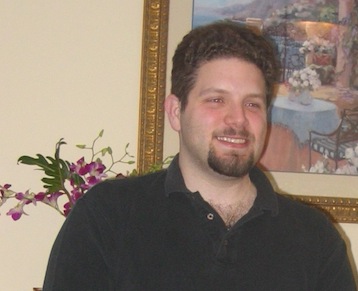
Proud father
to be 2005.
Technology.
What are the best telecommuting jobs?
I've found that companies who have nationwide
offices seem to have people used to communicating on
the phone and online meeting software regularly.
Nationwide teams are part of the way of life. I used
to travel to a company office to just sit on the
phone all day. Now I sit at home and no one (except
those who I tell) know the difference. And I don't
know when my colleagues are working from the office
or home that day.
12/11/11
Are telephone calls an
inefficient mode of communication?
Most ways to look at this are subjective. But from a
cost perspective, depending on your plan, you
generally pay more for the data for Skype voice
calls than you do for standard mobile voice minutes.
12/11/11
What was daily life like
before the internet?
I used to have to watch TV (or record it) when the
cable company said!
12/16/11
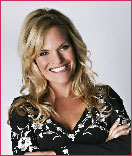 -- --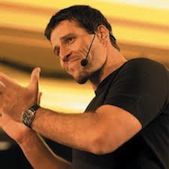
Loren Slocum
and Tony Robbins.
Outstanding magic moments 1990's.
Anthony
Robbins.
"How
often do you get a huge new understanding of
something you learned 10-20 years ago? It helps
having several geniuses as teachers. Have one (or
several) teachers whose books you read or classes
you take. Sometimes it's like I have little copies
of them in my head, discussing and coming out with
new pearls of wisdom!"
"Last night I was talking with a friend who was
asking about how I deal with "difficult" people.
As I was forming the answer (not that I'm an
expert, but I have some experience), I realized
that I only used one need of what Tony taught as
SIX needs. That was something I learned 18 years
ago, and now I got a whole new level to the
teaching! A gift that keeps on giving!"
"I recommend reading and learning from Master Choa
Kok Sui and Tony Robbins. The beauty of these
genius teachers is that not only do they have
teachings that keep on giving, but they also
recommend other great teachers and books. If you
read, think, and put things together, your life
will continue to improve even years AFTER you have
read the books." Extracts from Arnon's Facebook
- Written May 2011
Sunset
Over Oregon.

Arnon crossed over around
6pm.
July 23rd 1974 to December 21st 2013.
'Bear' has begun a new journey
but all i have to do is close my eyes and
i see his beautiful smile and i feel his
essence.
During his illness, i deeply researched,
then wrote and added two new pages to guide
cancer patients and their families on this
journey ...
Kill Cancer
Checklist for
cancer patients
- alternative vs
conventional.
Diagnosis Cancer
What IS cancer -
understand it and heal.
CANCER
IS A WAKE-UP CALL TO LET
GO. DETOXIFICATION
OF THE BODY AND MIND IS CRITICAL. CHANGE
IS MANDATORY.

Until we meet
again. XOX
To honor Arnon's memory, his
family and friends have chosen to give
donations in his name to:
Israel Children's Cancer Foundation
- www.israelcancer.org
This charity was
decided on for these
reasons: Arnon was born in Israel,
he lives on through his two little boys, he
loved to tithe and give to others, it's
non-profit, and because cancer took his life
on earth.
Cancer
Introduction - Choices,
guidance, and natural therapies.
©2002-2025
Chi Energy International
SOQI Health Magazine -
Conversation With Arnon.
Copyright
// About
|



